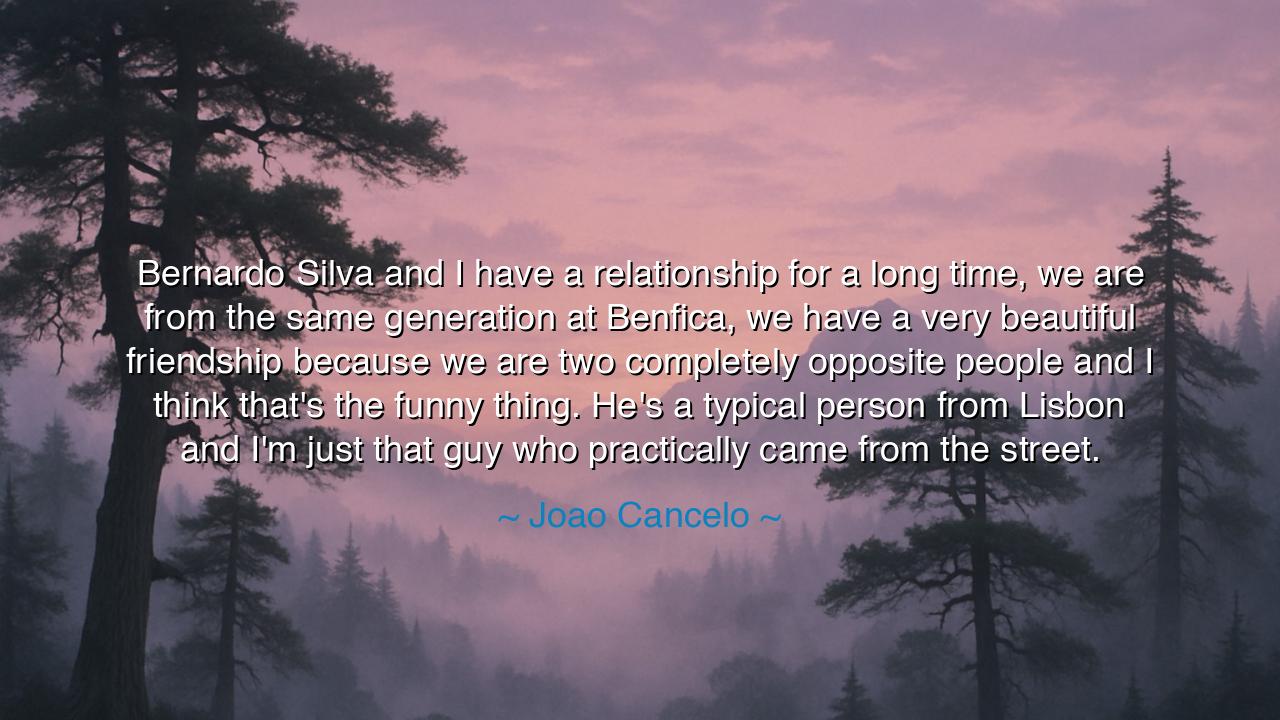
Bernardo Silva and I have a relationship for a long time, we are
Bernardo Silva and I have a relationship for a long time, we are from the same generation at Benfica, we have a very beautiful friendship because we are two completely opposite people and I think that's the funny thing. He's a typical person from Lisbon and I'm just that guy who practically came from the street.






“Bernardo Silva and I have a relationship for a long time, we are from the same generation at Benfica, we have a very beautiful friendship because we are two completely opposite people and I think that's the funny thing. He's a typical person from Lisbon and I'm just that guy who practically came from the street.” — thus spoke João Cancelo, a warrior of the modern age, not of sword and shield, but of spirit and struggle. In these words, spoken with humility and warmth, lies a truth as ancient as friendship itself — that the strongest bonds are not forged between those who are alike, but between those who complement one another in difference. Cancelo, who rose from hardship to triumph on the world’s greatest stages, reveals that true connection is not born from sameness, but from the meeting of opposites that teach, challenge, and complete one another.
The origin of this reflection lies in Cancelo’s own life — a story marked by both sorrow and resilience. Born in Barreiro, a humble district across the river from Lisbon, he came from struggle, from the “street,” as he calls it — a place where one learns to fight not only opponents, but circumstance itself. His friend and compatriot Bernardo Silva, on the other hand, hails from the capital, a city of refinement, structure, and opportunity. They met as young men at Benfica, Portugal’s great academy, where talent from every walk of life converges. There, two boys from different worlds found something rare — respect without rivalry, admiration without envy, affection without pretense.
When Cancelo says, “We have a very beautiful friendship because we are two completely opposite people,” he is not merely describing personalities — he is revealing a philosophy of life. For in a world that often seeks comfort in similarity, it is contrast that truly deepens the soul. The fire of one warms the calm of the other; the order of one steadies the chaos of his friend. Bernardo, composed and thoughtful, reflects the disciplined elegance of Lisbon; Cancelo, passionate and fierce, carries the heartbeat of the street. Together, they represent the two halves of the human experience — the refined and the raw, the thinker and the fighter.
The ancients, too, knew that harmony is born from difference. The philosopher Aristotle once said that friendship is “a single soul dwelling in two bodies,” yet even he knew that the greatest harmony arises when two distinct notes come together to form one beautiful sound. Consider the friendship between Alexander the Great and his general Hephaestion: one was fiery, restless, and consumed by glory; the other calm, loyal, and contemplative. Their bond endured because each saw in the other what he lacked — and what he needed. So it is with Cancelo and Bernardo: one carries the storm, the other the stillness, and in their meeting, they find balance.
Cancelo’s words also carry the humility of gratitude. When he calls himself “that guy who practically came from the street,” it is not shame, but pride — the pride of one who remembers his roots and honors them. In a world where success often erases memory, Cancelo remains grounded in the truth of where he began. And when he speaks of Bernardo with admiration, he shows us that friendship is not competition, but celebration — the joy of seeing someone different from oneself and loving them not in spite of that difference, but because of it. Their friendship, like their football, is an art — one built on understanding, mutual respect, and the laughter that arises from shared imperfection.
In this quote, there is also a subtle lesson on identity and unity. Cancelo reminds us that even in the most diverse of paths, the heart can find kinship. Whether born of privilege or poverty, whether calm or fiery, every human soul longs for connection. Friendship, in its truest form, dissolves the boundaries of background and temperament. It teaches us that strength is not sameness, but solidarity — the act of standing side by side, learning from one another, and finding humor, as Cancelo says, in the differences that once divided us.
Let this, then, be the lesson: do not seek friends who mirror your every thought or share your every step. Seek those who balance you — who challenge your certainty, who teach you patience or passion, who come from different worlds and yet speak the same language of heart and loyalty. For as João Cancelo reminds us, friendship is most beautiful when it bridges contrast — when the street meets the city, when the storm meets the sky, when the laughter between opposites becomes the thread that binds them.
Thus, his words stand not merely as a reflection of a bond between two footballers, but as a parable for all humanity: that difference is not a barrier, but a blessing. When two souls — however unlike — find respect, empathy, and love, they create something that no division can destroy. And in that meeting of worlds — one of light, one of shadow — the human heart rediscovers what it was always made for: friendship that unites without erasing, and love that understands without needing to be the same.






AAdministratorAdministrator
Welcome, honored guests. Please leave a comment, we will respond soon